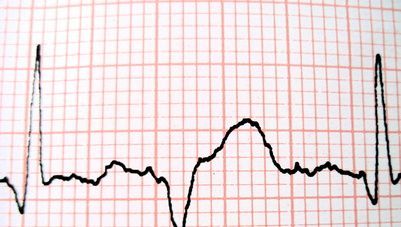The Merck Manuals, an online library of medical information, says, “Acute coronary syndromes result from a sudden blockage in a coronary artery. This blockage causes unstable angina or heart attack, or myocardial infarction, depending on the location and amount of blockage.” A normal heart rate is 60-80 beats per minute, but during a heart attack that rate is altered due to the disrupted blood flow. Heart rates during a heart attack can vary from too slow or fast to palpitations and even skipped beats. Where the blockage in the heart occurs often has a direct correlation on the type of heart rate.
Bradycardia
A slow heart rate is common during a heart attack. Bradycardia is a heart rate below 60 beats per minute and often with a heart attack is associated with chest pain or angina. If the heart rate is too slow, often below 40 beats per minute, dizzyness, passing out, inability to concentrate and dangerously low blood pressure result. The Mayo Clinic says, “Bradycardia is caused by something that disrupts the normal electrical impulses controlling the rate of your heart’s pumping action. Many things can cause or contribute to problems with your heart’s electrical system.”
Tachycardia
“Tachycardia is a faster than normal heart rate. A healthy adult heart beats 60 to 100 times a minute when a person is at rest. If you have tachycardia, the rate in the upper chambers or lower chambers of the heart, or both, are increased significantly. Heart rate is controlled by electrical signals sent across heart tissues. Tachycardia occurs when an abnormality in the heart produces rapid electrical signals.” (see reference 3) With a heart attack the damage to the heart muscle can cause it to accelerate, but the damage that occurred means the rapidly contracting heart pumps very little blood. “Tachycardias can seriously disrupt normal heart function, increase the risk of stroke, or cause sudden cardiac arrest or death.” (see reference 3)
Heart Blocks
A particularly lethal type of heart rate that can occur during a heart attack is a heart block. There are three types of blocks, each causing progressively more severe symptoms. During a heart attack, parts of the electrical conduction system can be blocked or damaged. When the electrical signal is blocked or altered, to beat in an organized fashion it creates a delayed heart rate response. Heart blocks are slow rate, and are often associated with very poor perfusion to the body causing loss of consciousness.
Premature Ventricular Contractions
Premature ventricular contractions, or PVCs, can occur with a heart attack, but they also are common and benign in people who have healthy hearts. But in heart attacks, once the heart muscle sustains damage from a lack of blood flow, it becomes irritable; the more irritable it becomes, the more PVSs occur. PVSs that occur in a row are called couplets, and lead to a feeling of pounding or fluttering in the chest. “Premature ventricular contractions are extra, abnormal heartbeats that begin in one of your heart’s two lower pumping chambers, or ventricles. These extra beats disrupt your regular heart rhythm, sometimes causing you to feel a flip-flop or skipped beat in your chest,” the Mayo Clinic says. The more frequent the PVCs, the greater the heart rate, so they are often associated with a higher heart rate. However, PVCs can be seen with any heart rate.
Expert Insight
Paramedics and others who work with patients clinically know that heart rates vary with a heart attack, and often change during the heart attack. Often, a patient will present with vague symptoms and a normal electrocardiogram, or EKG, and with in a few minutes the EKG will show a slow heart rate and the patient is unconscious. As the damage is occurring to the heart muscle from the blocked artery, the heart rate can change and will often progress into cardiac arrest.
Read the full article here




